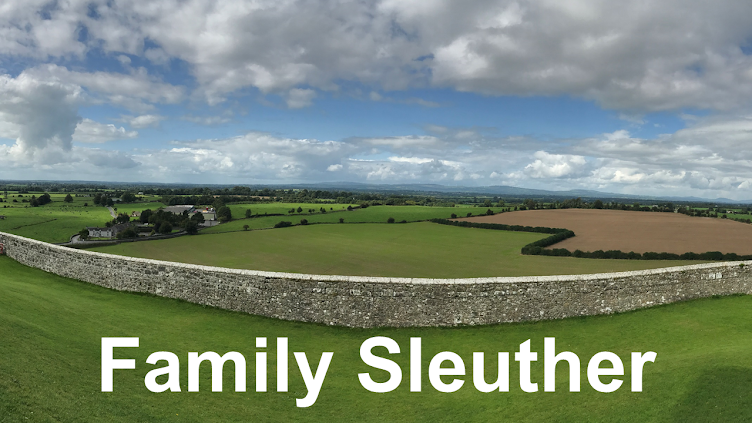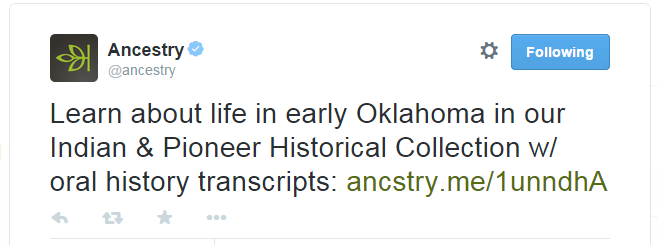Did you know Family Sleuther is on Twitter? Social media has been a tremendous asset in my genealogy research. Twitter is particularly helpful because it can serve as an educational clearinghouse providing loads of information and resources focused on family history. Sometimes, though, you really hit the jackpot.
Trawling through a slew of Tweets the other night, I landed on one posted by Ancestry.com that caught my eye. They had just updated their Oklahoma records to include oral histories about early Indian and Pioneer life in the state.
Having just wrapped up a family history road trip through Oklahoma, I thought it was worth plugging my Oklahoma family surnames into the database to see what would pop up. To my great surprise, a June 1937 oral history interview with my great-grandfather James Thomas Upton surfaced.
I know very little about him outside of what census records tell me in black and white. When asked to describe his father, my grandfather shrugged and succinctly surmised that James was just "some old man."
According to this oral history, James says he was born in Aurora, Arkansas. I knew he was born in Arkansas, but the city is new information. Furthermore, he sheds new light on the path his parents took to Oklahoma. James says his family came "by covered wagon to Webbers Falls, Indian Territory in 1877" and "that his parents farmed there one year." He continues by tracing the family's move to Kansas and back to Indian Territory.
James says that, "In 1880, they moved with horse teams and covered wagons back to the Indian Territory and settled in the Creek Nation some four miles north of Muskogee."
Aside from family movements, I learned more about James' life in Indian Territory. The interviewer surmised that, "Mr. Upton knows a great deal of old pioneer days pertaining to...the life and customs of the whites and Indians of the Five Civilized Tribes."
According to the interviewer, James Upton was an "agent" who was tasked with overseeing assimilation of members of the Osage and Blackfoot tribes into western society. While James shares a nuanced description of their cultural dress and burial practices, the interview paints a picture of a man not entirely sensitive to tribal culture. He describes one tribe as "savage, lazy and shiftless." It's quite clear James expects them to cease their nomadic lifestyle and settle into lives aligned with early pioneer settlers.
The oral history covers seven pages. Early in the text, the interviewer notes that James' experiences and recollections are similar to others already presented in the historical compilation. As a result, James' every detail would not be recalled for the reader. That's my loss, and I'm left particularly curious about the interviewer's final comments.
James "is a real pioneer and has suffered many adversities but is a true, loyal Oklahoman." What adversities does he allude to? I know James' first wife passed away, but is there something more? After highlighting that some of his children received an education, the interviewer concludes, "Mr. Upton himself is uneducated having only attended a three-month subscription school which cost his parents $1.50 for the three months."
This is genealogy gold. These are the details that make the fabric of a life, and put flesh on the bones. For better or worse, I have a clearer understanding of who my great-grandfather was and about his place in history. All of this, I owe to a Tweet.


No comments:
Post a Comment